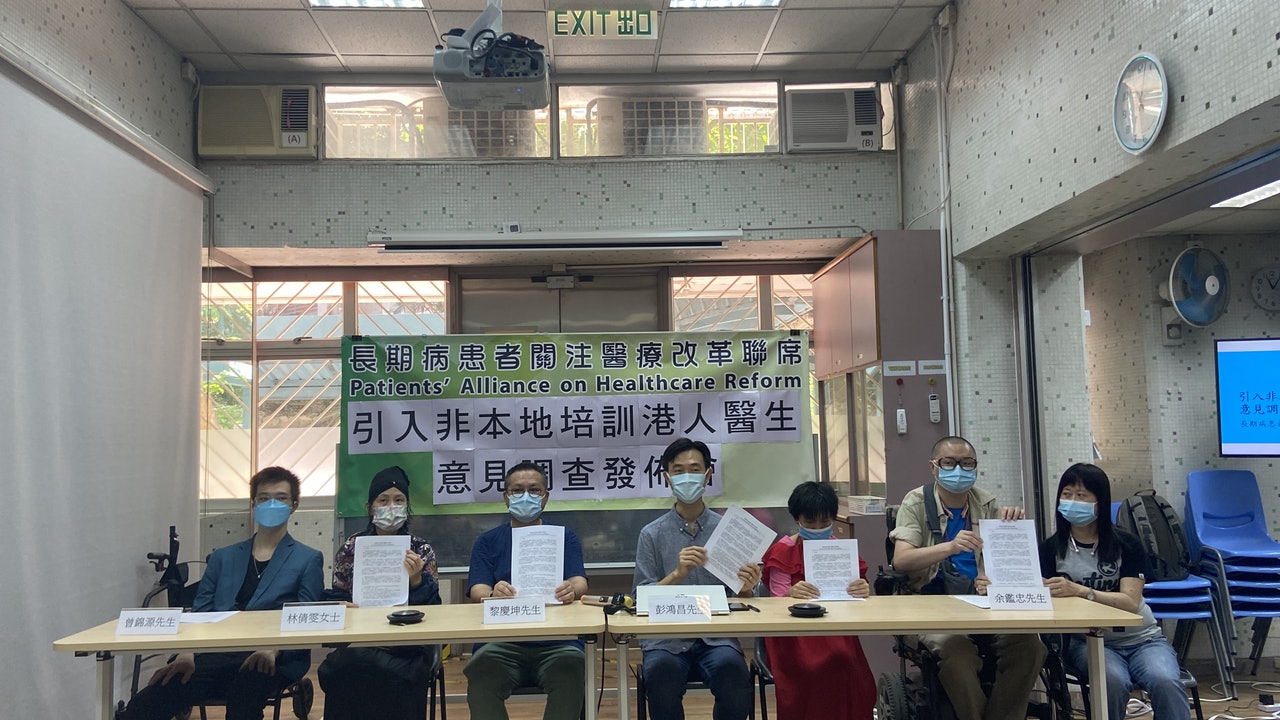Social News
Written by: Yuan Shu
2021-05-09 15:54
Last update date: 2021-05-09 15:56
The shortage of doctors has plagued Hong Kong's medical system for many years, and the shortage of manpower in public institutions has become even more serious.
The government proposed a draft bill, suggesting that permanent residents of Hong Kong should be allowed to graduate from designated medical schools overseas, and after they have the qualifications of specialist doctors to work in public institutions in Hong Kong for five years, they can obtain formal registration in Hong Kong, which sparked social discussions.
Chronic Patients Concerned about the Medical Reform Joint’s earlier online questionnaire survey found that 92.7% of the respondents believe that there is a serious shortage of doctors in Hong Kong, and 96.4% of the respondents agree that increasing manpower will help shorten the waiting time for medical services.
Regarding the government’s proposal to introduce non-locally trained doctors for exemption, 63.2% of the interviewees have confidence in such non-local doctors and believe that they have professional qualifications. Another 30 adults expressed no confidence.
In addition, 82.5% of the interviewees agreed that these overseas doctors still need to be satisfied with their clinical performance and pass the assessment before they can obtain official registration.
The chronically ill patients are concerned about the health care reform. The joint online questionnaire survey was conducted earlier.
(Photo by Yuan Shu)
The survey was conducted online from April 16 to May 5, 2021, and a total of 505 valid questionnaires were collected.
The survey showed that 92.7% of the respondents believed that there was a serious shortage of doctors in Hong Kong.
The average waiting time in the Accident and Emergency Department of public hospitals is 3 hours, and in some hospitals it is 8 hours. 90.3% of the respondents said it is unacceptable or absolutely unacceptable. The waiting time for the first consultation in public hospitals is 42 weeks, with the longest waiting time of 84 weeks. Up to 146 weeks, 93.3% of the respondents considered it unacceptable.
The patient fell and waited for 3 years before going to the doctor and missed the opportunity to walk again
Yu Jianzhong, a member of the patient organization, said that he accidentally fell a few years ago and later found a fracture of his left pelvis. He waited for the orthopedic department for 3 years. Later, a doctor told him that if the treatment can be completed half a year after the incident, he would have a chance to stand again. To walk, there is no need to rely on wheelchairs to get in and out.
Li Qingkun, a member of the patient organization, even pointed out that some patients have been plagued by other derivative illnesses due to the waiting time for specialists and have suicidal tendencies. He hopes that the government will implement the introduction of overseas doctors as soon as possible, shorten the waiting time for patients, and receive treatment as soon as possible.
Yu Jianzhong (second from right), a member of the patient organization, said that he accidentally fell a few years ago, but a doctor later pointed out that if he was able to complete the treatment six months after the incident, he would have the opportunity to stand and walk again.
(Photo by Yuan Shu)
Half think that introducing qualified non-locally trained doctors can solve the problem
The survey also found that 66.9% believe that increasing the number of medical students in local medical schools is an effective method in the short term, and 54.3% believe that the introduction of more qualified non-locally trained doctors is an effective method.
As for whether it is necessary to restrict non-locally trained doctors to restrict Hong Kong permanent residents, 49.7% of the respondents agree or strongly agree, and 40% disagree or strongly disagree.
Co-member Peng Hongchang pointed out that the data are not one-sided. Individual opinions pointed out that as long as the doctors "have medical ethics, professional recognition and rich experience, no matter what their nationality is."
Six adults have confidence in non-locally trained doctors and nearly 30% have no confidence
In addition, for “overseas registered doctors who graduated from designated medical schools, they can apply to the Medical Council for provisional registration after being hired by a Hong Kong public medical institution before they can work in a public medical institution.” The survey showed that 63.2% of the respondents expressed confidence or Very confident, with 28.9% expressing no confidence or very worried.
Some interviewees put forward individual opinions in the questionnaire and pointed out that the doctors introduced must have internationally recognized qualifications, and they are more worried and resistant to doctors from mainland China, Southeast Asia and the third world.
New Crown Vaccine | Cai Jian: As a doctor, government incentives to support mass vaccination are complicated
Variant virus | Kornhill confirmed that the Filipino domestic helper received only one injection, Doctor Fubitai explained the cause of the infection
01News
Doctors overseas doctors come to practice in Hong Kong

